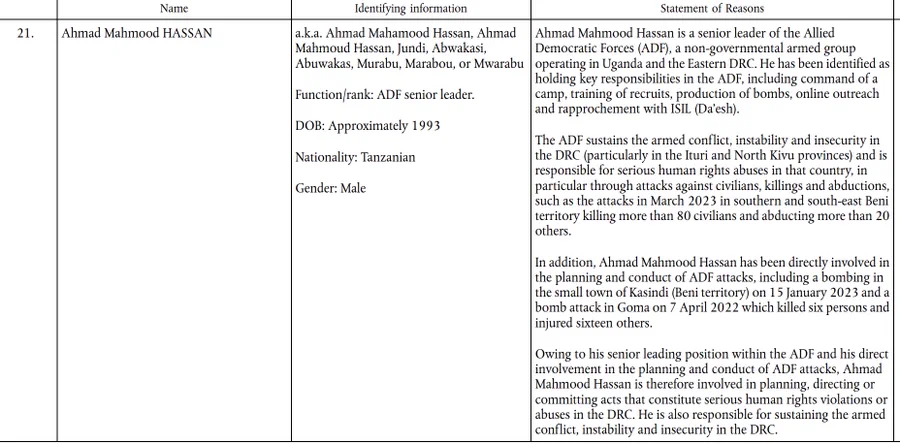The European Union (EU) has designated nine individuals responsible for human rights violations or abuses and for supporting armed conflict, instability and insecurity in the Democratic Republic of the Congo.
The EU Council at the close of last week imposed restrictive measures against nine Congolese and Rwandans responsible for acts constituting serious human rights violations or abuses in the Democratic Republic of the Congo (DRC), and the support for armed conflict, instability and insecurity in the DRC.
Those on the list include members of non-state armed groups active in the east and north-east of the country, namely M23, Twirwaneho group, Allied Democratic Forces (ADF), APCLS, CODECO/ALC and FDLR-FOCA, as well as a member of the Congolese Armed Forces (FARDC) and a member of the Rwandan Défense Forces.
“EU restrictive measures linked to human rights violations and election obstruction in the DRC now apply to a total of 24 people,” the council said in a statement.
On the list is a top ADF commander, Ahmad Mahmood Hassan, who allegedly masterminded last month’s attack on Mpondwe-Lhubiriha Secondary School in Kasese district.
A total of 44 people, mainly students, were killed in the attack.
Hassan, a Tanzanian national also known as Abu Waqas alias Jundi and Muwarabu, reportedly masterminded raids in the Beni and North Kivu territories of DRC.
“Ahmad Mahmood Hassan is a senior leader of the Allied Democratic Forces (ADF), a non-governmental armed group operating in Uganda and the Eastern DRC,” the EU said.

It added: “He has been identified as holding key responsibilities in the ADF, including command of a camp, training of recruits, production of bombs, online outreach and rapprochement with ISIL (Da’esh).”
According to the EU, the designated individuals are subject to a travel ban and asset freeze.
“In addition, EU citizens and businesses are prohibited from making funds available to them.”
The EU said it will continue to follow the situation in the DRC closely.
“It is ready to include on the list any new person implicated in serious human rights violations or abuses, as well as persons obstructing the electoral process and responsible for supporting armed conflict, instability and insecurity or inciting violence. The relevant legal acts have been published in the Official Journal of the European Union.”
Context
EU autonomous individual restrictive measures due to the situation in the DRC were adopted by the Council for the first time in 2016, in response to serious human rights violations and the obstruction of the electoral process.
On 5 December 2022, the Council decided to modify the criteria for designation in order to allow the application of individual restrictive measures against natural or legal persons, entities or bodies which maintain or support the armed conflict, instability or insecurity in the DRC, or who benefit from it, as well as persons responsible for inciting violence or instrumentalizing armed conflict, instability and insecurity in the DRC, in particular by engaging in illicit exploitation and trade in natural resources.











